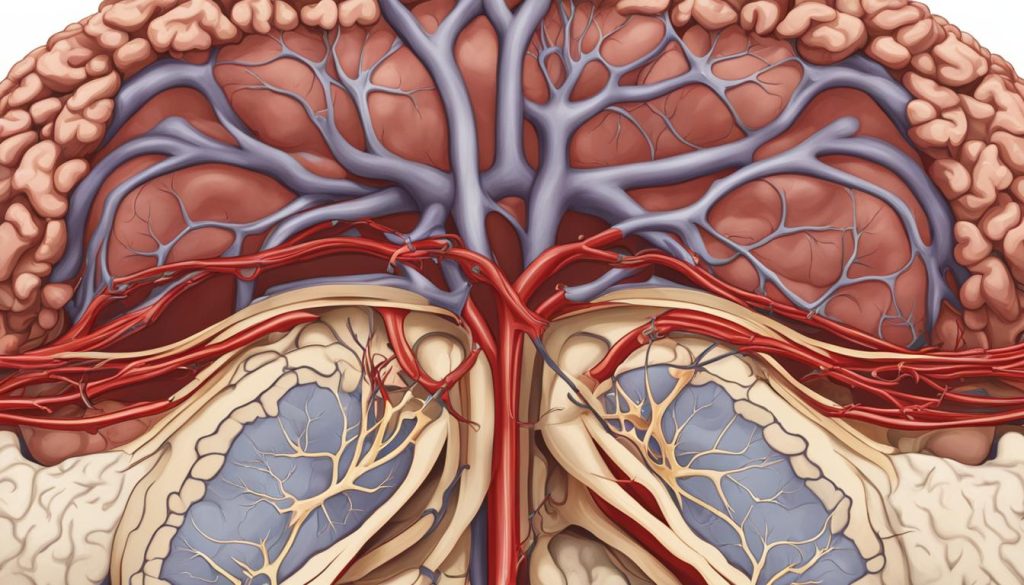Heavy drinking and stress hormones have a crucial connection that can significantly impact our overall health. Studies have shown that excessive alcohol consumption can disrupt the endocrine system, which is responsible for maintaining a constant internal environment in our bodies. This disruption can lead to hormonal disturbances and various disorders, including stress intolerance, reproductive dysfunction, thyroid problems, immune abnormalities, and psychological disorders.
Key Takeaways:
- Alcohol abuse disrupts the endocrine system, leading to hormonal imbalances and various health issues.
- The endocrine system, along with the nervous system, controls the flow of information between organs and cells in the body.
- The hypothalamic-pituitary axis is a critical part of the endocrine system that regulates hormone production and release.
- Cortisol, a stress hormone, is increased in heavy drinkers and may contribute to the negative effects of alcohol abuse on the body.
- Long-term alcohol use can have serious effects on mental and physical health, including anxiety, depression, cancer, sleep disturbances, hypertension, heart disease, obesity, and weakened immunity.
Now that we understand the link between heavy drinking and increased stress hormones, it is crucial to explore the role of the endocrine system in the body and how alcohol consumption affects it.
The Role of the Endocrine System in the Body
The endocrine system, along with the nervous system, plays a crucial role in regulating various bodily functions and maintaining homeostasis. It consists of several glands that produce and release hormones, chemical messengers that coordinate and control the activities of different organs and tissues.
At the center of the endocrine system lies the hypothalamus, a small region in the brain that acts as the link between the nervous system and the endocrine system. The hypothalamus secretes hormones that control the function of the pituitary gland, often referred to as the “master gland” because it regulates the secretion of hormones from other glands in the body.
The pituitary gland produces and releases a variety of hormones that influence growth, reproduction, metabolism, and stress response. It works in coordination with other endocrine organs, such as the thyroid gland, adrenal glands, endocrine pancreas, and endocrine adipose tissue, to maintain the body’s overall function.
Together, these glands ensure the proper functioning of the immune system, which plays a vital role in protecting the body against infections and diseases. Hormonal disturbances within the endocrine system can have profound effects on human health, leading to conditions such as hormonal imbalances, metabolic disorders, and impaired immune function.
In order to understand the effects of alcohol on the endocrine system, researchers have conducted studies using both human subjects and animal models. These studies have provided valuable insights into how alcohol abuse can disrupt the delicate balance of hormones and impact overall physiological function.
The Hypothalamic-Pituitary Axis and Alcohol’s Impact

The hypothalamic-pituitary axis plays a crucial role in the regulation of hormone production and release in the body. It consists of the hypothalamus and the pituitary gland, which work together to ensure the proper functioning of various hormones. Alcohol abuse can disrupt the delicate balance of this axis, leading to hormonal imbalances and associated health issues.
The hypothalamus, located in the brain, produces and secretes hormones that control the synthesis and release of hormones in the pituitary gland. These hormones include corticotropin-releasing factor, luteinizing hormone-releasing hormone, thyrotropin-releasing hormone, growth hormone-releasing hormone, somatostatin, and dopamine. Each of these hormones plays a vital role in the regulation of the body’s functions and maintaining homeostasis.
Alcohol abuse can disrupt the normal functioning of the hypothalamic-pituitary axis, leading to hormonal imbalances that can have far-reaching effects on the body.
For example, the corticotropin-releasing factor, released by the hypothalamus, stimulates the release of adrenocorticotropic hormone (ACTH) from the pituitary gland. ACTH, in turn, triggers the release of cortisol from the adrenal glands, which is involved in the body’s response to stress. Excessive alcohol consumption can dysregulate this process, leading to increased production of cortisol and prolonged stress responses.
Effects of Alcohol on Trophic Hormones
Trophic hormones, such as growth hormone-releasing hormone and luteinizing hormone-releasing hormone, play a crucial role in growth, reproduction, and cellular function. Alcohol abuse can disrupt the synthesis and release of these trophic hormones, leading to growth and reproductive disorders.
Alcohol’s Impact on Dopamine
Dopamine, often referred to as the “pleasure hormone,” is involved in the brain’s reward system. Alcohol consumption can lead to the release of dopamine, resulting in feelings of pleasure and reward. However, chronic alcohol abuse can desensitize the brain’s dopamine receptors, leading to decreased dopamine production and potential mood disorders.
| Hormone | Function |
|---|---|
| Corticotropin-releasing factor | Stimulates the release of ACTH and cortisol |
| Luteinizing hormone-releasing hormone | Regulates reproductive function |
| Thyrotropin-releasing hormone | Controls thyroid hormone synthesis |
| Growth hormone-releasing hormone | Promotes growth and repair |
| Somatostatin | Inhibits the release of growth hormone and other hormones |
| Dopamine | Involved in pleasure and reward |
Alcohol Consumption and Cortisol Levels
When it comes to the impact of alcohol on our stress hormones, cortisol plays a significant role. Cortisol is a hormone released by the adrenal glands in response to stress, helping our bodies manage and adapt to challenging situations.
Research has shown a clear connection between alcohol consumption and cortisol levels in the body. Heavy drinkers, in particular, have been found to have higher cortisol levels compared to moderate drinkers. This suggests that excessive alcohol consumption can lead to an elevation in cortisol levels, even during non-stressful periods.
Furthermore, heavy drinkers also experience a blunted decline in cortisol levels throughout the day. In a normal, healthy individual, cortisol levels typically reach their peak shortly after waking up and gradually decline as the day progresses. However, heavy drinkers show a disrupted cortisol decline pattern, indicating reduced control of the hypothalamic-pituitary-adrenal (HPA) axis.
Excessive alcohol consumption can disrupt the delicate balance of the HPA axis, which is responsible for regulating cortisol production and release. This dysregulation can have significant implications for both our physical and mental health.
“Excessive alcohol consumption disrupts the normal decline of cortisol levels over the day, indicating potential HPA axis dysregulation.”
Understanding the Cortisol Awakening Response
One specific phenomenon related to cortisol secretion is the cortisol awakening response (CAR). CAR is characterized by a spike in cortisol levels within 30-45 minutes after waking up. It is thought to reflect the body’s anticipation and preparation for the day ahead.
Studies have found that heavy drinkers have an altered CAR compared to moderate drinkers. This means that heavy drinkers may exhibit either a reduced or exaggerated cortisol response upon waking up, further highlighting the impact of alcohol consumption on cortisol regulation.
The Role of Cortisol in Mental and Physical Health
Cortisol plays a crucial role in various aspects of our health, including immune function, metabolism, and stress response. Elevated cortisol levels have been associated with an increased risk of mental health disorders, such as anxiety and depression, as well as physical health issues including cardiovascular disease, obesity, and weakened immune system.
The dysregulation of cortisol associated with heavy alcohol consumption may contribute to the development of these long-term health consequences. It’s important to recognize the potential detrimental effects of alcohol on cortisol levels and take steps to reduce alcohol consumption for overall health and well-being.
Understanding the interplay between alcohol consumption and cortisol levels provides valuable insights into the complex effects of alcohol on our bodies. By making informed choices about alcohol consumption, we can better manage our stress hormone response and promote overall health.
The Link Between Alcohol and HPA Axis Dysregulation

Alcohol consumption can have a significant impact on the functioning of the hypothalamic-pituitary-adrenal (HPA) axis, which plays a crucial role in the body’s stress response. When we drink alcohol, it stimulates the production of cortisol in the HPA axis, the primary stress hormone. This increased cortisol production can lead to pleasurable effects, as well as the release of dopamine, another important neurotransmitter.
However, prolonged and excessive alcohol use can disrupt the balance and functioning of the HPA axis, resulting in dysregulation of the stress response system. This dysregulation can lead to blunted stress responses and negative feelings, making it more challenging for individuals to cope with stressful situations. It may also contribute to alcohol cravings and increased alcohol consumption as individuals seek to alleviate dysregulated stress responses.
Understanding the link between alcohol and HPA axis dysregulation is crucial in addressing the complex relationship between alcohol abuse and stress. By recognizing the impact alcohol has on the HPA axis, we can develop targeted interventions and treatment strategies to mitigate the negative effects and promote healthier stress management techniques.
| Effects of Alcohol | HPA Axis Dysregulation |
|---|---|
| Stimulates cortisol production | Leads to increased stress hormone levels |
| Triggers dopamine release | Contributes to pleasurable effects |
| Prolonged alcohol use | Impairs HPA axis functioning |
| Blunted stress responses | Difficulty coping with stress |
| Increased alcohol consumption | Attempts to alleviate dysregulated stress responses |
Long-Term Effects of Alcohol on Health and Stress
Excessive and chronic alcohol consumption can have detrimental effects on both mental and physical health. Long-term alcohol use is associated with an increased risk of various health issues, including anxiety, depression, cancer, sleep disturbances, hypertension, heart disease, obesity, and weakened immunity.
Alcohol’s impact on the stress response and increased cortisol levels play a significant role in these health consequences. Prolonged alcohol abuse has been shown to contribute to the development and exacerbation of mental health disorders such as anxiety and depression. Additionally, alcohol consumption has been linked to an increased risk of several types of cancer, including liver, breast, throat, and colorectal cancer.
Furthermore, chronic alcohol use can disrupt sleep patterns and lead to sleep disturbances. Alcohol interferes with the natural sleep cycle, resulting in decreased sleep quality and fragmented sleep patterns. This can contribute to fatigue, daytime drowsiness, and impaired cognitive function.
Long-term alcohol use also has adverse effects on cardiovascular health. It can lead to hypertension (high blood pressure) and increase the risk of heart disease. Excessive alcohol consumption can weaken the heart muscle, disrupt heart rhythm, and contribute to the accumulation of plaque in the arteries.
Moreover, alcohol consumption is associated with weight gain and obesity. Alcoholic beverages are high in calories and can contribute to an imbalance in energy intake. Excessive alcohol consumption also impairs metabolic function, making it more challenging to maintain a healthy weight.
Additionally, chronic alcohol use weakens the immune system, making individuals more susceptible to infections and illnesses. Alcohol’s suppressive effects on the immune system impair the body’s ability to fight off pathogens, increasing the risk of infections and reducing overall immune function.
Quote:
Long-term alcohol abuse can have a devastating impact on both mental and physical well-being. It significantly increases the risk of developing various health conditions, including anxiety, depression, cancer, sleep disturbances, hypertension, heart disease, obesity, and weakened immunity.
It is essential to understand and address the long-term effects of alcohol on health and stress. By recognizing the risks and seeking appropriate support and treatment, individuals can take steps towards improving their overall well-being and quality of life.
Conclusion
After examining the crucial connection between heavy drinking and increased stress hormones, it is evident that alcohol consumption significantly impacts the body’s stress response system. Prolonged alcohol abuse can lead to disturbances in hormonal balance, disrupt the functioning of the hypothalamic-pituitary axis, and elevate cortisol levels. To improve overall health and reduce stress, it is essential to reduce alcohol consumption and seek appropriate treatment options.
Treatment for alcohol use problems and high-stress levels often involves multiple approaches. Detox and withdrawal are typically the initial steps to rid the body of alcohol and manage the physical dependence. Coping skills, therapy, and relaxation techniques play a crucial role in addressing the underlying causes of alcohol abuse and managing stress effectively.
In some cases, medications may be prescribed to help regulate physiological responses and support recovery. Additionally, support groups can provide a valuable platform for individuals to connect with others facing similar struggles, share experiences, and learn from one another’s journeys. By combining various treatment options, individuals can find the support and tools they need to overcome alcohol use problems, reduce stress, and improve overall well-being.
FAQ
How does alcohol abuse affect the endocrine system?
Alcohol abuse disrupts the endocrine system, leading to hormonal imbalances and various health issues. It can interfere with the functioning of the hypothalamic-pituitary axis, affecting hormone production and release.
What is the role of the hypothalamic-pituitary axis in the body?
The hypothalamic-pituitary axis regulates hormone production and release. The hypothalamus produces hormones that control the synthesis and release of hormones in the pituitary gland, affecting key bodily functions.
Does alcohol consumption affect cortisol levels?
Yes, alcohol consumption has been found to increase cortisol levels in the body. Heavy drinkers often have higher cortisol levels and a blunted decline throughout the day compared to moderate drinkers.
How does alcohol impact the body’s stress response system?
Alcohol consumption can dysregulate the hypothalamic-pituitary-adrenal axis, disrupting the body’s stress response. It stimulates cortisol production and triggers the release of dopamine, leading to pleasurable effects in the short term but impairing stress responses in the long term.
What are the long-term effects of excessive alcohol consumption on health?
Excessive alcohol consumption is associated with various health problems, including anxiety, depression, cancer, sleep disturbances, hypertension, heart disease, obesity, and weakened immunity.
Can reducing alcohol consumption help lower stress hormone levels?
Yes, reducing alcohol consumption and seeking appropriate treatment can help lower stress hormone levels and improve overall health. Treatment options may include detox, therapy, medication, and support groups to address alcohol use problems and manage stress effectively.

